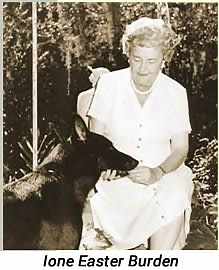About Us
History
Burden Museum and Gardens offers 440 acres of green space located in the heart of Baton Rouge. It consists of the LSU AgCenter Botanic Gardens, Windrush Gardens and the Rural Life Museum. The property was owned by the Burden family from the mid 1800s and donated to the LSU System in 1966. The donors were Steele Burden, former landscaper for the LSU Campus; his sister, lone Burden, former assistant dean of women at LSU; and Mrs. Jeanette Burden, widow of their brother, Pike Burden.
 The Burden family stipulated in the act of donation that the property be used for
horticultural, agronomic and environmental research and extension, development of
the Rural Life Museum, and as a green space for the community and visitors to enjoy.
The Burden Foundation was formed to ensure basic compliance with the intent of the
donation and provide monetary support to the facility.
The Burden family stipulated in the act of donation that the property be used for
horticultural, agronomic and environmental research and extension, development of
the Rural Life Museum, and as a green space for the community and visitors to enjoy.
The Burden Foundation was formed to ensure basic compliance with the intent of the
donation and provide monetary support to the facility.
The Botanic Gardens supports a wide array of research and extension projects relating to agronomy, soil and environmental sciences, turfgrass, vegetable crops, fruit crops, ornamentals, landscaping, home gardening and wetlands. It is also responsible for historic Windrush Gardens. Botanic Gardens' amenities include the lone Burden Conference Center, the Steele Burden Memorial Orangerie, Burden Pavilion, All-America Selections Trials, Children's Garden, Tropical Garden, Herb Garden, Rose Garden, Stone Camellia Collection, Burden Woods, Trees and Trails, Barton Arboretum and the Black Swamp.
LSU A&M, also in Baton Rouge, is responsible for the development of the LSU Rural Life Museum at Burden and the 26 acres of land it occupies. The LSU Rural Life Museum represents the 1800's and early 1900's plantation era in Louisiana history.
Cultural Landscape Report
The Cultural Landscape Report completed by Suzanne Turner Associates in 2010 traces the historic development of the landscape, identifies the elements that are significant and should be protected, pinpoints the sections of the landscape that have lost their original integrity and are in need of design intervention, and articulates what the essential qualities of the landscape as a cultural resource are.
Mission
The Mission of the Botanic Gardens is to promote the importance of plants and their environment to the physical, mental and spiritual well being of the citizens of Baton Rouge, the state of Louisiana and the world.
The mission is accomplished through a three pronged approach:
-
Performing research and facilitating the research of others to develop sustainable plants and landscapes for agriculture and horticulture.
-
Educating the community through demonstration of the value of this research and these plants by enabling direct access to these fields and gardens.
-
Bringing people back to nature by providing a diversity of green places and special facilities to engage in conversation, create a community and to commune with nature.
Vision
Similar to the way Steele Burden sought to improve with every garden he designed, it is the vision of the Botanic Gardens to become the best horticultural research and outreach facility in the United States, making an impact on the world.
Master Plan
An updated Master Plan for Burden Museum & Gardens was completed in 2021 by Suzanne Turner Associates with CARBO Landscape Architecture. The two-year project provides the Rural Life Museum and the Botanic Gardens with a unifying vision and mission that will continue to transform the wonderful gift from the Burden family to the community. The Rural Life Museum and the Botanic Gardens will continue separate missions with a plan that provides a path to unify operation, programming, physical connectivity, and the implementation of new and exciting destinations.
Focus on Urban Agriculture Education
The LSU AgCenter Botanic Gardens at Burden has been undergoing significant changes as it refocuses from a crops research station to a center for urban agriculture education. Read more about urban agriculture education.


